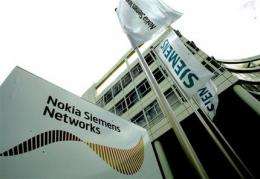In this file photograph taken May 8, 2007, the company logo of Nokia Siemens Networks is displayed in front of the headquarters in Munich, southern Germany. Nokia Siemens Networks says it will acquire the majority of Motorola's wireless operations in a $1.2 billion deal.(AP Photo/Diether Endlicher)
(AP) -- Motorola Inc. said Monday that it is selling most of its wireless network division to Nokia Siemens Networks, a Finnish-German joint venture, for $1.2 billion as part of a planned breakup of the company.
The division supplies wireless carriers such as Verizon Wireless and Sprint Nextel Corp. with the equipment they need to connect to cell phones. It's not a big player in an industry dominated by LM Ericsson AB and Alcatel-Lucent, but it does have valuable relationships with U.S. and Japanese carriers that Nokia Siemens hopes to exploit.
About 7,500 employees will be transferred to Nokia Siemens, Motorola said. The company is based in Schaumburg, Ill., but the networks division has large development centers in India and China.
Nokia Siemens Networks - a joint venture between Finland's Nokia Corp. and Siemens AG of Germany - has seen dwindling profits in recent years, worsened by the global economic downturn. The deal, expected to be completed by the end of the year, would improve profitability and "have significant upside potential," Nokia Siemens said.
Motorola has planned for years to spin off the division that makes cell phones, but steep losses in the unit have forced it to postpone the move. The spin-off is now scheduled for the first quarter of next year.
The handset division, to be called Motorola Mobility, would take with it the division that makes cable set-top boxes.
That would leave Motorola Solutions, the remainder, focused on government and corporate clients, with products such as police radios and bar-code scanners. It's also keeping one part of its wireless network portfolio: the division that makes iDEN equipment, used in the Nextel part of Sprint Nextel Corp.'s network. Motorola invented that technology and is the dominant supplier of equipment.
Its push-to-talk feature is appreciated by dispatchers and work crews, but has been overshadowed in the mainstream by other technologies that provide broadband data speeds.
The wireless division has had some success in the business of making equipment for broadband networks that use WiMax, but that technology looks set to be a niche at best. The major wireless carriers are planning to use a technology known as LTE, for Long-Term Evolution. Motorola hasn't secured any LTE contracts in the U.S., but has signed one with KDDI in Japan.
Motorola shares rose 15 cents, or 2 percent, to $7.50 in pre-market trading Monday. The shares have gained more than 40 cents since The Wall Street Journal reported last week that a deal with Nokia Siemens was in the offing.
U.S.-listed Nokia shares were up 15 cents, or 1.7 percent, at $8.89.
©2010 The Associated Press. All rights reserved. This material may not be published, broadcast, rewritten or redistributed.



















